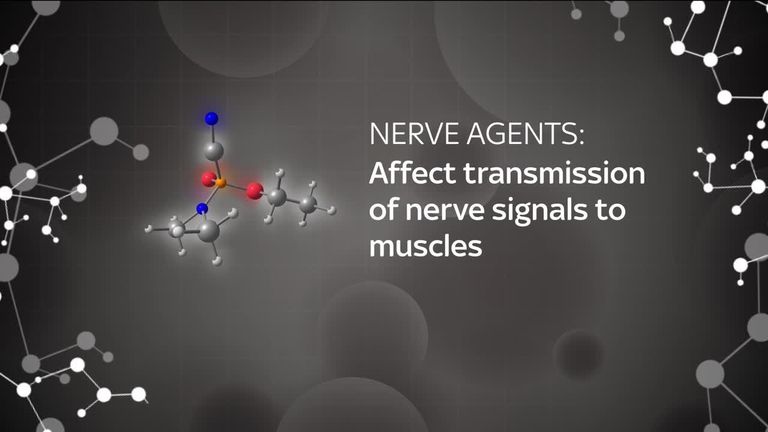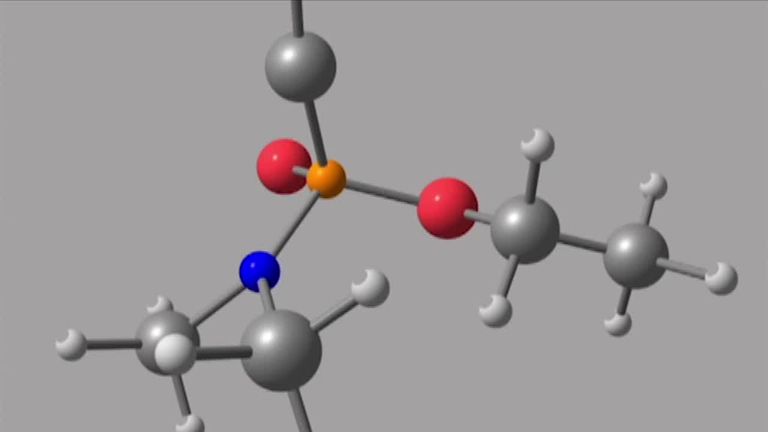Novichok has become the focus of international scrutiny once again after a prominent critic of Russian president Vladimir Putin was found to have been poisoned with the nerve agent.
A statement from Berlin’s Charite Hospital, which is treating Alexei Navalny, said he remains in a serious condition in intensive care and his breathing is being supported.
It added that while symptoms are receding, he is expected to suffer a long period of illness.
He appears to have been exposed to the same chemicals as the former Russian spy Sergei Skripal in Salisbury, Hampshire, in 2018.
Here we take a look at who made novichok, how the nerve agents are used and the effect they have on the human body.
Who made it?
There are more than 100 formulations in the novichok family, all developed by the Soviet Union in the 1970s and 1980s.
Novichok, among the deadliest nerve agents ever created, is the Russian word for “newcomer”.
How is it used?
Novichok agents are dispersed as an ultra-fine powder rather than a gas or vapour.
They can be inhaled, ingested, or absorbed through the skin.
What are the symptoms?
As with other nerve agents, the chemicals block acetylcholinesterase, an enzyme active in the nervous system.
The result is involuntary contraction of all muscles, leading to cardiac arrest and asphyxiation.
What happened to Alexei Navalny?
Mr Navalny, the leader of the Russian opposition, was taken ill on a flight back to Moscow from Siberia on 20 August.
The 44-year-old was taken to a hospital in the Siberian city of Omsk after the plane made an emergency landing.
Mr Navalny was eventually flown to Germany on a medical plane to Berlin’s Charite hospital after much opposition from the Kremlin and doctors in Omsk.
The German government said on Wednesday that hospital tests had shown Mr Navalny was “without doubt” poisoned with a nerve agent from the novichok group.
Mr Navalny’s doctors have said the poisoning was “severe”.
They added that he remained in an induced coma in intensive care on a mechanical ventilator and was being treated with atropine, which is used to treat certain types of nerve agent and pesticide poisoning.
When was it used in the UK?
Former Russian spy Sergei Skripal and his 33-year-old daughter Yulia, who was visiting from Moscow, were found unconscious near a shopping centre in Salisbury in March 2018.
Then-prime minister Theresa May said days later that they had been poisoned with novicohok and demanded an explanation from the Russian government.
Ms May later said Russia was responsible for the attack and 23 Russian diplomats were expelled from the UK in retaliation.
The Skripals were treated in the UK and survived the attack.
Three Russian intelligence officers named Alexander Mishkin, Denis Sergeev and Anatoliy Chepiga are suspected of being behind the attack.
How did it get to the UK?
Andy Oppenheimer, a biological and chemical specialist, has told Sky News the chemical could have been brought into the UK through an airport.
“These things can evade detection if they are very small amounts and very well shielded, whether they are biological, chemical or a biological agent,” he says.
“This chemical may have come through an airport, we really don’t know yet.”
Is washing clothing enough to protect yourself from it?
Following the poisoning of Sergei and Yulia Skripal, Dame Sally Davies, chief medical officer for England, issued “highly precautionary” advice to those concerned.
She said: “As before, my advice is to wash your clothes and wipe down any personal items, shoes and bags, with cleansing or baby wipes before disposing of them in the usual way.
“You do not need to seek advice from a health professional unless you are experiencing symptoms, as any individual who had been significantly exposed at the same time would by now have symptoms.”
Mr Oppenheimer says the advice was just a “precaution”.
He told Sky News: “Unlike a conventional explosive device going off, it really has a kind of a spread, it will produce particular symptoms.
“I would have thought those symptoms would have emerged by now and all the advice is a precaution.”
Is there an antidote?
All nerve agents have an antidote in atropine, but it needs to be administered as soon as possible.
A common problem is that it can take time to diagnose that a nerve agent has been used.
Does it contravene international law?
Novichok is “highly illegal”, “extremely powerful” and created to avoid detection, says Mr Oppenheimer.
Significantly, several of the novichok chemicals are so-called binary weapons – with two less-toxic precursor chemicals that can be mixed prior to use.
This makes them safer to transport and handle.
One of these is novichok-5, derived from the highly potent A-230 chemical. Its precursor chemicals are ordinary organophosphate pesticides and can be legally made at agricultural chemical manufacturers.
According to Dr Vil Mirzayanov, who worked on the novichok programme in the Soviet Union until he fled to the US, the legitimate use of precursor chemicals was deliberate as it meant they were not placed on the controlled list of the Chemical Weapons Convention.




